|
|
|
Sort Order |
|
|
|
Items / Page
|
|
|
|
|
|
|
| Srl | Item |
| 1 |
ID:
165929
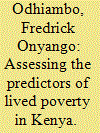

|
|
|
|
|
| Summary/Abstract |
Poverty remains pervasive in Kenya despite efforts to reduce it. This may be attributed to poor understanding of its predictors. Using Afrobarometer Round 7 data and employing multivariate logistic regression, the study found that age, religion and political affiliation were risk factors associated with poverty while education was a protective factor. The study recommends that investing more in all levels of education is key to reducing poverty in Kenya. Further, social protection policies and programmes for the elderly, as well as initiatives to enhance savings for those in the informal economy, are important for poverty reduction.
|
|
|
|
|
|
|
|
|
|
|
|
|
|
|
|
| 2 |
ID:
132912
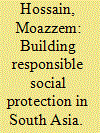

|
|
|
|
|
| Publication |
2014.
|
| Summary/Abstract |
inspired by the global ambition to eradicate poverty through the Millennium Development Goals, to be achieved by 2015, this article finds that continuing population growth in South Asia will make such goals impossible to achieve. Rather than sinking into despair, however, the article first captures specifically the major demographic reasons behind the troubling bottlenecks of development in South Asia. Since tackling those demographic issues will not yield tangible results in the short run, the focus of analysis then switches to arguing that other creative development remedies are indeed feasible. Given that there is no scarcity of food in South Asia, but it simply does not reach those who need it most, the article demonstrates that India's recent Food Security Act of 2013 may be a globally relevant model of concerted state action to tackle deep poverty and avoid mass starvation. This article breaks new ground in relation to implementing state-led social welfare measures, showing that earlier assessments about Asian development may have been too pessimistic.
|
|
|
|
|
|
|
|
|
|
|
|
|
|
|
|
| 3 |
ID:
110871


|
|
|
|
|
| Publication |
2012.
|
| Summary/Abstract |
Old-age income protection is provided in wealthy democracies by publicly funded defined-benefit pensions. Budgetary challenges have forced policy makers to consider private alternatives to these traditional systems. I consider the shortcomings of private saving arrangements in duplicating the advantages of public pensions. Some shortcomings can be overcome by introducing compulsory elements into private saving plans. Worker contributions into such plans could be mandatory; some or all worker accumulations in the plans could be converted to annuities at retirement; and workers' investment choices could be narrowly circumscribed. These restrictions do not eliminate the biggest weakness of private saving plans. Fluctuations in asset prices make it hard even for well-informed savers to select an affordable saving rate and an investment strategy that will assure decent income in old age. Public pension systems partly insulate workers against economic and financial market risks by sharing those risks broadly across workers, retirees, and taxpayers in multiple generations.
|
|
|
|
|
|
|
|
|
|
|
|
|
|
|
|
| 4 |
ID:
132533


|
|
|
|
|
| Publication |
2014.
|
| Summary/Abstract |
The rapid manner in which social protection systems have gained prominence and political support in development and poverty reduction discourse over the past few years is practically without precedent, leading some to consider it "a quiet revolution." Latin American countries have been at the forefront of this "revolution," with political support for government-funded social protection mechanisms going hand in hand with a growing discourse in favor of a human rights approach in development agendas. This approach is in line with the constitutions of most Latin American countries (including Argentina, Bolivia, Ecuador, Colombia, Guatemala, and Brazil), which enshrine a long list of human rights and explicitly recognize that these norms impose limits on state power. This constitutional protection of rights includes not only civil and political rights, but a wide range of economic, social, and cultural rights (see e.g. the constitutions of Colombia, Brazil, and Costa Rica), the prohibition of discrimination (on the grounds of gender, age, ethnicity, disability, sexual orientation, health status, and others), and the obligation to take affirmative action to protect groups that have suffered from structural discrimination (see e.g. constitution of Ecuador).
|
|
|
|
|
|
|
|
|
|
|
|
|
|
|
|
| 5 |
ID:
130052


|
|
|
|
|
| Publication |
2014.
|
| Summary/Abstract |
Social protection has become part and parcel of the development response in Southeast Asia and across the globe and is likely to gain even greater prominence in light of the post-2015 development agenda. Its set of objectives has steadily widened with social protection now expected to fulfil a plethora of functions ranging from household-level consumption smoothing to macro-level economic stabilization. Notwithstanding the many achievements of social protection to date, this paper aims to inject a healthy dose of realism into current debates about its appropriate roles. This paper particularly reflects on the productivity-enhancing and growth-inducing focus within social protection - a particularly strong feature in Southeast Asia - and how this undermines principles of inclusivity, human rights and social justice. As an antidote to this Machiavellian type of social protection, this paper argues for "Inclusive Social Protection", focusing on equitable coverage, realistic expectations and better integration of policies and programmes.
|
|
|
|
|
|
|
|
|
|
|
|
|
|
|
|
| 6 |
ID:
117686


|
|
|
|
|
| Publication |
2012.
|
| Summary/Abstract |
This paper reviews the current social protection system in Vietnam with a special focus on access of the poor and vulnerable people. It shows that the system has been expanded to cover more poor and vulnerable people. However, at the same time, delivery of services and financing are still unequal between groups, in which advantaged groups have better utilization of services than disadvantaged groups. To reach a social protection floor, especially a universal health insurance coverage by 2015, the paper argues that the Government of Vietnam will face a number of challenges, in which financing is the most critical. Also, to expand retirements and social assistance effectively, focusing on the poor and vulnerable groups will ensure a sustainable poverty reduction.
|
|
|
|
|
|
|
|
|
|
|
|
|
|
|
|
| 7 |
ID:
184241
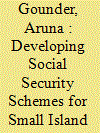

|
|
|
|
|
| Summary/Abstract |
COVID-19 has triggered deep economic damage and devastated livelihoods to an extent never before experienced. It has revealed socio-economic vulnerabilities and so can be used as a learning platform in preparing for future shocks. In particular, it has exposed the vulnerability of households to sudden, severe, and prolonged income shock, the significance of social security as a shock response tool, and the importance of household resilience for macroeconomic stability. This study uses the pandemic as an opportunity to understand the resilience of Fijian households to profound and prolonged income shocks, given these households’ social, cultural, and economic setting. It evaluates national response strategies, household coping mechanisms, and gaps in the current social security measures in Fiji. This evaluation reveals several key lessons for a systematic response to any future shocks. The lessons may prove beneficial not only for Fiji, but also for other similar economies in the region. Policy makers can build on the operational learning and capacity developed during the pandemic, reinforce existing social security systems, and be better prepared for future income shocks. Fiji and other Pacific Island economies are highly vulnerable to climate-related risks and have endured the adverse economic effects of some extremely intense natural disasters. It is important for these economies to strengthen household resilience and develop sustainable and broad-based programs for social protection.
|
|
|
|
|
|
|
|
|
|
|
|
|
|
|
|
| 8 |
ID:
117684
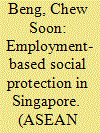

|
|
|
|
|
| Publication |
2012.
|
| Summary/Abstract |
The social protection system in Singapore can be defined in terms of having the ability and opportunity to work for a family wage for at least thirty years in order to own a house, provide adequate healthcare protection for the family, pay for children's education as well as provide a stream of income during the post-employment period. Singapore's protection system is superior in many ways but there are deficiencies. For instance, any discontinuity in employment or breakup of the family will threaten this social protection system. Furthermore, some low-income workers have to continue to work even in their seventies. The paper makes some recommendations for the improvement of the social protection system in Singapore.
|
|
|
|
|
|
|
|
|
|
|
|
|
|
|
|
| 9 |
ID:
166475
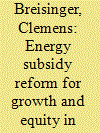

|
|
|
|
|
| Summary/Abstract |
Phasing out energy subsidies is high on the agenda of policymakers in several Middle Eastern and North African countries. The impact of such reform can vary widely depending on the country and policy. This paper contributes to the existing literature by examining the phasing out of energy subsidies in Egypt under alternative economic scenarios. In particular, we consider Egypt's short- and long-term economic adjustment under different assumptions on labor market flexibility, spending options of subsidy savings, and alternative social protection measures. Results from economy-wide model simulations suggest that energy subsidy cuts may hamper economic growth in the short term, but depending on the policy measure, will improve growth perspectives and household welfare in the longer term. Yet, findings also point to likely adverse impacts of the reform on household consumption in the short and longer run. To counteract such negative impacts, targeted social protection measures should be continued and scaled up in parallel with the phasing out of energy subsidies.
|
|
|
|
|
|
|
|
|
|
|
|
|
|
|
|
| 10 |
ID:
130055


|
|
|
|
|
| Publication |
2014.
|
| Summary/Abstract |
In this article, we explore the nexus between information and communications technology (ICT), remittances and output per worker in Vietnam from 1980 to 2012. Within the augmented Solow framework, we deploy the autoregressive distributed lag bounds procedure and Granger causality tests to examine the short-run and long-run effects and the direction of causality, respectively. The results show that ICT has a momentous short-run (0.002 per cent) and long-run (0.006 per cent) effect on per worker output. However, in the long run, the elasticity coefficient of remittances is positive but not significant within the 1-10 per cent level of significance, and the short-run results show mixed effects. The causality result indicates bidirectional causation between remittances and output per worker, duly emphasizing their mutually reinforcing effect and a unidirectional causation from capital per worker and ICT to remittances, respectively.
|
|
|
|
|
|
|
|
|
|
|
|
|
|
|
|
| 11 |
ID:
130053
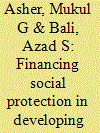

|
|
|
|
|
| Publication |
2014.
|
| Summary/Abstract |
Demographic trends portend the rapid ageing of Developing Asia (DA), albeit at varying rates. This phenomenon, along with the need to extend coverage of social protection systems is likely to increase public and private expenditure on social protection, particularly for pensions and healthcare. This paper analyses the options for additional financing of social protection in DA. As total national and fiscal resources devoted to social protection increase, an important issue will be how the additional burden is shared between different sectors, and financing instruments. The paper, however, focuses on options to finance additional social protection expenditure. Three broad options are suggested: first, realizing efficiency gains in managing provident and pension fund organizations; second, design and service delivery innovations including better policy coordination and coherence within and amongst healthcare and pension programmes; third, developing capabilities to obtain resources from conventional and unconventional sources of budgetary revenue. The paper also stresses that complementary reforms in fiscal, labour market, financial and capital markets will be needed to manage rapid ageing in DA, and therefore the issue of ageing should be viewed as involving several economic and social arrangements, and not in isolation.
|
|
|
|
|
|
|
|
|
|
|
|
|
|
|
|
| 12 |
ID:
156668
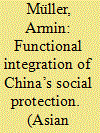

|
|
|
|
|
| Summary/Abstract |
Frictions between China’s institutional legacies of the planned economy and the new trends of marketization, urbanization, and migration have shaped institutional change in social protection. Focusing on health and pension insurance, this study identifies a gradual process of functional integration, which overcomes the frictions and facilitates a dualization of benefits.
|
|
|
|
|
|
|
|
|
|
|
|
|
|
|
|
| 13 |
ID:
181814
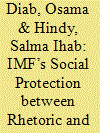

|
|
|
|
|
| Summary/Abstract |
A substantial body of literature has been produced about the IMF’s drift away from neoliberal orthodoxy in the aftermath of the 2007/08 global financial crisis. This article assesses the degree to which the IMF’s post-crisis change in discourse toward adding more emphasis on social protection was put into action in Egypt’s 2016 economic reform program. Beyond a noticeable discursive change, our research found that there was very little—if any—practical change. First, we demonstrate how the social component of the program was much smaller than the neoliberal or ‘business-as-usual’ component, not only as a share of program measures but also in terms of their magnitude. Second, we found that even this small component had a very similar equivalent in the last major program between the IMF and Egypt in 1991, thus rendering it less novel, and therefore casting doubt on the IMF’s claims of change.
|
|
|
|
|
|
|
|
|
|
|
|
|
|
|
|
| 14 |
ID:
128176
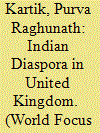

|
|
|
|
|
| Publication |
2014.
|
| Summary/Abstract |
After 1950s a large number of Indians migrated to United Kingdom (UK) with cultural, traditions and religious values and practices, which included practice of caste discrimination too. As Dr. BR Ambedkar anticipated, the Indian migrants will carry the caste system to other regions of earth and it would become a problem of the world. This prediction came true as cast discrimination has indeed migrated with the Indian Diaspora to east and south Africa, Mauritius, Fiji, Surinam, the middle east (for example in Bahrain, Kuwait, the United Arab Emirates), Malaysia, the Caribbean, the United Kingdom, North America, and other regions (Natural 2001). With the other Indian Diaspora dalits (untouchables) of India also migrated to the UK. It has been estimated that around 250000 dalits are living in the UK (CERD 79, UK Report.).
|
|
|
|
|
|
|
|
|
|
|
|
|
|
|
|
| 15 |
ID:
178234
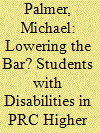

|
|
|
|
|
| Summary/Abstract |
In the People's Republic of China, the 2015 (revised) Higher Education Law provides that citizens enjoy the right to receive higher education. That legal ideal, however, is not easy to implement in practice. One important issue in higher education is the extent to which in law and in practice the educational rights and interests of students with disabilities are realized. In anticipation of difficulties, the same law specifically requires Chinese higher education institutions to enrol disabled students who meet the relevant admission qualifications and it explicitly prohibits rejection on grounds of disability. Admission standards and processes, however, remain a problem, as do social attitudes to disability, and other difficulties persist in securing the rights and interests of disabled persons in higher education. The complications that arise remain significantly under researched and are not explicitly addressed in the Higher Education Law. Proposals for reform are not likely to succeed without substantial changes in societal and governmental attitudes.
|
|
|
|
|
|
|
|
|
|
|
|
|
|
|
|
| 16 |
ID:
117683
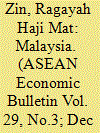

|
|
|
|
|
| Publication |
2012.
|
| Summary/Abstract |
This paper argues why Malaysia needs to strengthen and provide more formal social protection. It describes the social protection programmes currently available in Malaysia - public assistance; and social security and insurance schemes including employer's liability scheme, Workmen's Compensation Scheme, civil service pension, Employees Provident Fund (EPF), Armed Forces Provident Fund, and Social Security Organisation (SOCSO) insurance schemes. The paper also attempts to identify the challenges faced by these programmes, especially in terms of coverage, governance and sustainability. Policy recommendations include finding ways to protect the informal sector, relooking at the EPF Annuity Schemes proposals and promoting them again to EPF members, improving transparency and accountability of civil service schemes by subjecting them to regular evaluations and making it publicly available. The introduction of a minimum wage, the discussion of introducing unemployment insurance and raising the retirement age to sixty years in the private sector this year augur well for the Malaysian workers.
|
|
|
|
|
|
|
|
|
|
|
|
|
|
|
|
| 17 |
ID:
126107
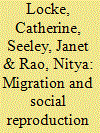

|
|
|
|
|
| Publication |
2013.
|
| Summary/Abstract |
This review paper focuses on low-income migrants in (or from) developing countries and their social reproduction, and asks what this means for their social protection. We focus on the recognition that migration involves (re)negotiations of social reproduction by migrants and their families. These renegotiations are heavily inflected with gendered power relations in ways that are specific to individual and family life course. As such, migration involves taking on new risks and dynamic vulnerabilities in sustaining everyday and intergenerational social reproduction. These are sharpened by the increasing feminisation of migration flows and obstructed by wider changes in social provisioning and exclusionary citizenship regimes. The resulting social protection challenges unfold over lifetimes, and are especially marked at critical periods of transition. Life-course thinking has the potential to theoretically integrate emerging insights from rich empirical studies; doing this supports the rationale for revaluing the importance of social reproduction within debates about migration and social protection.
|
|
|
|
|
|
|
|
|
|
|
|
|
|
|
|
| 18 |
ID:
126106
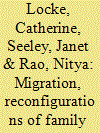

|
|
|
|
|
| Publication |
2013.
|
| Summary/Abstract |
This introduction reviews the contributions this collection of articles makes to understanding migration, social reproduction and social protection. Migration necessarily involves reconfigurations of family relations and these entail changes in the patterning of social (in)security. Our expansive interpretation of the concepts of social reproduction and social protection situate the reorganisation of gendered family lives as integral to the migration-development nexus. Life-course thinking informs analysis of how migrants 'do family' and what this means for gender, identity and (in)security. The collection explores how 'care deficits' are managed, both discursively through the negotiation of gendered ideologies about gender identity and the family, and through the everyday practice of social reproduction. The resulting reorganisation of social security involves taking on new risks and vulnerabilities for migrants and their families. For both internal and international migrants the challenges involved in securing social reproduction are powerfully shaped by welfare and migratory regimes and raise important questions about the relationship between social protection and broader social policy and citizenship issues.
|
|
|
|
|
|
|
|
|
|
|
|
|
|
|
|
| 19 |
ID:
131458
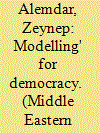

|
|
|
|
|
| Publication |
2014.
|
| Summary/Abstract |
Although Turkey has come a long way in terms of human rights since the 1980 military coup, a closer historical look inside the Turkish political scene shows us how freedom of speech was always to be sacrificed if its exercise threatened the perceived unity of the country. The article shows how decision makers' perceptions of the state as a superior institution in need of protection have shaped the practice of governing free speech in Turkey since the early years of the Republic, and introduces a unique chronology, accounting for the interaction of internal and external influences.
|
|
|
|
|
|
|
|
|
|
|
|
|
|
|
|
| 20 |
ID:
126240


|
|
|
|
|
| Publication |
2013.
|
| Summary/Abstract |
While the literature on 'global care chains' has focused on the international transfer of paid reproductive labour in the form of domestic service and care work, a parallel trend takes the form of women marriage migrants, who perform unpaid labour to maintain households and reproduce the next generation. Drawing on our work with commercially matched Vietnamese marriage migrants in Singapore, we analyse the existing immigration-citizenship regime to examine how these marriage migrants are positioned within the family and nation-state as dependants of Singaporean men with no rights to work, residency or citizenship of their own. Incipient discussions on marriage migrants in civil society discourse have tended to follow a 'social problems' template, requiring legislative support and service provisioning to assist vulnerable women. We argue for the need to adopt an expansive approach to social protection issues, depending not on any one single source-the state, civil society and the family-but on government action to ensure that these complement one another and strengthen safety nets for the marriage migrant.
|
|
|
|
|
|
|
|
|
|
|
|
|
|
|
|
|
|
|
|
|